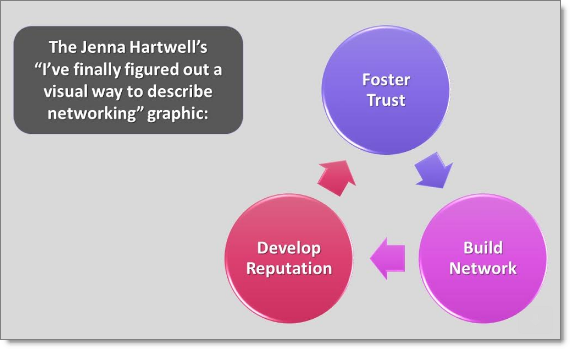This is part of a continuing series called Ask the Coaches, where YOU pose a question that I send to dozens of career experts, and they give their awesome responses. IF YOU ARE A CAREER EXPERT and want to be on the list, email me (contact link at bottom of any page).
This week’s question comes from Kathy:
I am struggling with networking. If you are in a new area, what is the best approach to making new contacts?
Great question… for many, they aren’t new in an area, but once they are in job search it sure can feel new. The responses are below…

It’s not easy breaking into a new area with few contacts and resources to lean on. Three things I recommend to get you started:
- Join a job seeking group–they pop up in different forms but the best and easiest way to find one is to check in with your local One-Stop Career Center (www.servicelocator.org) and they should be able to point you in the right direction to one. Other entities to check out are local churches, veterans associations and experience Experience Unlimited and MeetUp.com to name a few. You will meet other professionals, and get on their radar for opportunities that might not be a fit for them but perfect for you. It also helps to know you are not alone–and to be a support to others on this journey.
- Join and/or attend association or industry events to increase your visibility and to get to know what is happening in your new town. You don’t need to say you are “unemployed”, but that you are “working on some projects” (sure it may be yourself) and that you are looking at (not for) new opportunities in the area. The idea is that you are always in charge of your job search and that everything is a possibility (not a need, want, desire).
- Volunteer somewhere. It doesn’t have to be in your industry, but it will help to get you involved in the community and away from the computer and outside of your head. Serving others less fortunate than you is the best way to get you into a positive mindset and with an attitude of gratitude. If you can find somewhere that can utilize your unique skills sets, even better!

Dear Kathy,
I am not sure if you are looking for a new job in your new city or you simply want to meet others but either way, the process is the same.
First, start by reaching out to newcomer’s groups in your area.
Second, via meetup.com, join groups you are interested in.
Third, become a member of the professional associations in your industry.
Fourth, going to church on Sunday, not only helps the spririt but it is a great way to meet others.
Fifth, volunteer either at your church or pick a nonprofit you feel strongly about.
But remember true networking is about meeting one person at a time, so be intentional about getting to know others.
I hope these suggestions help.
Wishing you the very best in your new career!

Excellent timing for this question – networking has been on my mind a lot this week!
Before sharing some ideas, I think it’s extremely important to first mention what networking is NOT.
Networking is not about the number of people in your contact list.
Networking is not being fake.
Networking is not about being an extrovert.
Networking is about trust.
It is about creating a community of people around you who want to invest in your success (and believe that, if given the opportunity, you would do the same for them). From those trusting relationships we build our network and from building that network we develop a positive reputation which, in turn, fosters more trust. It’s a cycle. See:
Keeping all of this in mind, here are some practical ideas:
- Start with the people in your life who already know and trust you. You never know whose uncle’s cousin’s sister in law lives in your city or is knowledgeable about your field.
- Join affinity groups through meetup.org or your local chamber of commerce. These don’t have to be in your career area – they could also be for a hobby or interest! Several of my friends have built new networks through the World Adult Kickball Association.
- Find alumni from your college/university through LinkedIn or your school’s alumni association (call the office – they would love to help you!)
- If you’re someone who isn’t at your best in in-person situations; use the phone! In an age where so many of us are bound to email, a call can be refreshing and a nice middle ground for people who prefer to network from home.
- Engage your “nag” – find that overly honest person in your life who pushes you to do the things you don’t want to. There is nothing a nag wants to hear more than “I need your help.” Schedule a weekly call with them about who you met since your last conversation.
- Find the local chapter of your professional association. When I first moved back to North Carolina, the people at the NC Association of Colleges and Employers quickly became my second family!
- Focus on your successes no matter how small. A case of the ‘shoulds’ coupled with negative self talk lead to spending the evening on the couch (not networking).
- Take a class at your local university.
- I love the forums on city-data.com. Every city has their own unique culture and learning from the locals is a great way to find places to network.
- Volunteer. Idealist.org, volunteermatch.org, or even your local non-profit association can help you find places to help yourself while you’re helping someone else.

Leverage the power of LinkedIn, whether it is a new area in terms of location or in terms of industry sector you are looking to move into.
LinkedIn is like attending a big networking event with more than 400 million users, it’s the largest professional social network. With the various functions, it’s a great tool to find companies, people, and jobs in any location and industry. You can reach out and connect, start conversations, network and build up new contacts. There are also various groups you can join which is another great way to join new communities and expand your network.
The important thing is that you have your profile up to date and really showcasing who you are, what you do and the value you bring. People want to see clearly and quickly what you are about and why they should connect and network with you. Not having an updated and complete profile is like turning up at a networking event in your pajamas and mumbling. Not many people would want to engage and talk with you! Your summary is key this is your introduction, think about what you would say to someone if you met them in person about who you are and what you do. This is what you want to put there
Around 99% of people fail to optimize their profile and aren’t using LinkedIn to their advantage so be in the 1% and have a profile that really stands out and then your ability to connect and network gets a whole lot easier.
Also, it’s important when you reach out you send an introduction with the connect message giving a bit of detail about why you want to connect.
Part of the work I do as a career strategist, coach and mentor is to help people to stand out and shine with their LinkedIn profile as well as understanding how to use it to its full potential to develop their personal brand, grow their network and increase their career opportunities. LinkedIn is for your career life, not just a new job.

As the author of Rock Your Network® for Job Seekers, I recommend the following steps for Kathy and others who are newly relocated:
- Determine your goal for networking. This impacts the type of groups you will explore and join. If your networking goal is for job search, you’ll want to explore area job search groups. Additionally, I recommend joining a local chapter of your professional association. For example, PRSA if you’re in PR; ATD, if you’re in training and development; ASQ if you’re in quality management, and so on. Check out LinkedIn’s “groups” tab to see if there are relevant groups for your networking goals in your area.
- Update your LinkedIn profile with a current professional photo, summary, and experience. This way, when you’re exploring connections and groups, people can easily associate your name with a face.
- Create a sound bite you can modify and use when meeting new people. Instead of, “I’m between jobs right now.” When asked, “So, Kathy, what do you do?” you’ll have a polished sound bite you can share that’s positive and focused. (Chapter 5 in my book has a formula you can repurpose.)
- Check out the local Chamber of Commerce. Typically, they’ll have Business After 5 or other networking events you can attend. One of my clients who’d recently relocated had no local network. She volunteered for her Chamber of Commerce and updated their website. She had a master’s degree in information technology. The chamber wrote a press release about it, highlighting her expertise. She was introduced to several business leaders in the area and was hired by one of them to run their IT department.
- Volunteer for a cause you believe in. If you have a tight budget and are unemployed, one thing you do have is time. Volunteering demonstrates your leadership skills, you’ll meet people interested in the same cause as you, and often business leaders are involved in those efforts. This gives you a chance to talk about something you enjoy and are passionate about, which makes networking easy and natural.
Finally, don’t forget your new neighbors, friends and family who may have connections in your area, local sports events, farmers markets, and more. When you have your polished sound bite, it’s much easier to start a conversation with those you meet.
These tips will help you get started. I recommend making a networking plan to make regular progress toward your goals and positive connections with your local market. You got this!

Kathy, this is a great question and one I’m often asked to respond to. Ask anyone in career services (and in sales as well) and we will all agree the single most important component of success is making and staying in contact with people you know and those you want to know, both in and outside your current or desired field or profession. This is why I am a proponent of reaching out to make a minimum of three contacts a day. Imagine this – 3×30 = 90 people you reach out to every month and 3×365 = 1095 people you now have in your network in the course of one year. This is what serious and successful networkers do!
This said, networking in a new city is more challenging and requires additional effort to yield tangible results. In addition to standard Networking 101 techniques, you will need to consider more unconventional and perhaps less comfortable than you prefer measures. At the outset, you’ll also need to make a modest financial investment in yourself, if you have not already done so. The first investment is to create a catchy business card to hand out to the people you’ll meet to remember you and know how to contact you. I use and recommend Vistasprint, a low cost high quality option. The second investment is, I recommend a low cost or free website and/or blog (check out Wix.com and WordPress). Here you can showcase your resume and bona fides, and have a URL on your business card along with your fully optimized LinkedIn profile page URL so people can check you out, follow you, connect with you, and refer you to others.
Now, here are networking suggestions in a new city and they work in your hometown as well.
- Step out of your comfort zone. For many this means being less timid and much more sociable. Go to a sports bar for Saturday College football and Sunday and Monday night pro football (or whatever sport you enjoy or is in season) and start a conversation with the people around you rather than sitting like a wallflower and waiting to be approached by others. You can also go to a movie, a concert or the theater, a museum or a lecture by your lonesome and strike up a conversation with the people you meet on line and at the event. You never know what will happen—or whom you will meet—when you step outside of your comfort zone.
- Take up or continue a hobby. Find those things you want to do but your pocketbook or inner voice often says Nah. For example, join a business district or local gym or health club. Take a Yoga, Spin or kickboxing class. Join a flag football or softball league. Try a new restaurant or bar in the business district. Whatever you do, steel your nerves and walk into a room or place full of new people.
- Go on Dates. For those who are single, going on dates is a great way to meet new people—even if you don’t hit it off romantically, you could strike up a friendship. If you’re male, ask a woman out and don’t stop asking if you’re rejected. Women, you too can ask a man out. So get out of your comfort zone, take a flyer, and accept an offer or ask out a nice guy or gal, even if he or she is not someone you’d ideally choose. Be up front and say “I’m new to this city and I’d like to get to know you and your friends.” If you’re seeing, someone expand your horizons and get creative: Branch out from your neighborhood and go places where there are crowds. When on line at a movie, ballgame, or anywhere you go strike up a conversation with the people around you and let you partner know why are so friendly to strangers.
- Volunteer: So many causes you can support need your help where you can spend time doing something you’re passionate about. Try to keep it close to your field of work if possible. Political clubs are also a good place to volunteer and network and meet influential people in a new city.
- Seek out fellow alumni and former co-workers. Search fellow college and even HS alumni on LinkedIn. Then reach out and connect with them, tell them what your connection is and you want to speak with them. If they listed a phone number, take the initiative and give them a call. The same for fellow coworkers who may be in your new city or have contacts on LinkedIn who live where you are now living.
- Take chances and say YES: If you get invited to places or events, where there are a lot of people that are not in your wheelhouse or comfort zone say YES. This may be an invite to go bowling, dancing or skiing, to go to a lecture or attend a C&W, Rock or Classical music concert to name a few. In other words, make it your policy to socially say YES rather than to always say No or giving an excuse.
- Sign up and attend classes: Continuing education in your field or something related (or even in something that interests you) is a great place and way to meet likeminded people who you can easily start a conversation with. They are also likely to have a network of people you can tap into.
- Join Toastmasters: This has a double benefit. Aside from meeting career minded people who are out to advance their career, you will have an opportunity to improve your public speaking ability and hone your business persona.
- Check out Meetup in your new locale. This allows you to meet people in different walks of life who share common interests with you. Take a chance and get involved, after a while, you will meet some great and helpful people.
- Join your local area LinkedIn group and professional associations. The members of these groups are people you could and should be reaching out to, and most sponsor networking events you can and should attend.
- Faith Based Networking. For some this is a first and natural step in networking in a new city. For those who are unaffiliated, lapsed religiously, agnostic or atheists this can be uncomfortable. However most houses of worship and faith based organizations have tremendous resources they are willing to share with newcomers in a city and they can be exceedingly helpful in picking you up when you feel alone, down, lost, home sick or hopeless.

Kathy, one of the best approaches to making new connections is to join a group or volunteer to work where you have common interests and are passionate about a cause. If you have interests in some type of sport, exercise, are a music lover or an avid reader of books or bird watcher, there are likely to be groups of people in your area with the same interest (s) that you have. Many of these groups meet on a regular basis in your area.
You are in luck if you are on Facebook. There is an “Events” tab that appears under the “more” tab on your home page. Check this out because by clicking on this tab, you will find a list of events that are happening in your area that may be of interest to you. I found Fall Festival train rides to watch the Fall Foliage in October, a few jazz events, a tour of vintage homes, a few plays at local theatres and book clubs…all in my local area. And, the best part is that it lists my Facebook friends who are planning to attend.
Once you attend one of these events or contact the leader of the group, the networking becomes easier.
Not on Facebook, try your local newspaper. There are always listings of what’s happening in your new area. If possible, bring a neighbor or co-worker with you.
If you are in a career transition, perhaps there is a local Five O’clock Club meeting that you can attend. Simply “Google” the name and view their website and attend a meeting. The key is to attend these events and making those connections. Don’t forget to connect with everyone you meet on LinkedIn and your number of connections will increase greatly!
All the best and happy networking!

Unless you have family or friends in a new area when relocating, networking can be a challenge. If you don’t know anybody in your new community, the best approach to making new contacts is by searching on LinkedIn for that location. You might be surprised to find that you have a connection who knows someone in the new area. I was surprised when I searched on LinkedIn for “Cheyenne.” I’ve lived in New England all my life, and I chose the most obscure location for illustration purposes. I don’t know anybody who lives in, or has ever lived in, Wyoming. However, on LinkedIn, I found that a former co-worker of mine knows an executive director of a prominent non-profit organization. If I were moving to Cheyenne, I’d call John and ask him to introduce me to this individual. I would then call the person in Cheyenne to introduce myself, and that John suggested I contact him since I’m planning to move to Cheyenne. Being a friend of a friend, I have no doubt he would be helpful and make my transition much smoother. As I mentioned in a previous blog post, “Don’t search for jobs; search for people.”

I was in this exact situation when I moved from the East Coast to the West Coast. So I know what it’s like to have to make contacts in the new location. Now one thing I had done is this. Once I knew where I planned on moving, I took an extended vacation to visit and stay in the new location for a while. And while there, I had worked with some local temp agencies to gain some employment. This helped put me in contact with companies in the new area. And gave me an opportunity to meet some people there. So I was able to gain some local work experience ahead of my move.
Another thing one can do when they have relocated is join local groups. For example, there may be a local networking group for job seekers in your particular field or just in general. This is a nice way to interact with people in the local community who may be able to throw you some leads. And/or introduce you to others who may be able to help out.
You can also use a local religious house of worship. So becoming part of a local congregation will also help put you in contact with locals in that area. And allow you to let them know you’re seeking employment. They might know somebody who can help. Or take your resume and pass it along where they happen to work.
One more way to network is visiting the local unemployment office. Depending upon the area, there may be more than one. That’s the case where I live. Other places just have a single office. Either way, it gives you a chance to interact with some local job seekers. And you can meet with a local counselor there to look over your resume, do a mock interview, and help you with companies in the area.
It’s also pretty common for unemployment offices to host local events. So they may have one or more employers coming into the office to meet with potential new hires. Picking up a calendar of events will let you know what’s upcoming. And there may be postings of upcoming job events posted in the office.
Visiting a local park or other public place is another networking opportunity.. For example, you may be sitting on a park bench next to somebody and strike up a conversation. That gives you the chance to let them know you’re new to the area and are looking for employment.
The same goes for visiting local coffeehouse or juice bar. It’s very common to meet new people in warm and comfortable settings like this. So it’s easy enough to converse with others who might be able to help. Or may take your resume and pass it along to where they work or somebody they know. FYI, it’s pretty common for recruiters and hiring managers to meet with people in this kind of place. And work on going through applications and resumes. I’ve seen this many times at various coffeehouses in my area. And have struck up conversations with those people.
The bottom line here is this. Look to places where there are lots of people around with whom you can strike up conversations. And where it’s more relaxed so people are more willing to open up and meet new people. Also take advantage of the local unemployment office and library for upcoming job-related events. And hit the local employment agencies for some work, even if it’s temporary. Lastly, make sure you are always armed with your resume! So keep a stack with you to hand out at a moments notice.

I find that the very word “networking” tends to bring out nerves and apprehension among most job seekers. My first suggestion is to throw the word “networking” out and look at it as relationship-building, and then approach it as you would any new relationship. Also, since you’re in a new area, it’s a great opportunity to do double-duty: you’ll likely want to check out the “hot spots” in your new locale, get a feel for the local culture and vibe, and discover activities that fuel your interests…and you can meet people who can become new companions and also serve as professional connections.
You may want to join a local club, take a fitness class, or sign up for a “sip and paint” event! The main thing is that you select activities that you are interested in and that allow for conversation– and make it a point to say hello and introduce yourself to people! When the pressure to network for a job (or to advance your career) is off, you’ll be able to relax, enjoy yourself, and present the “real you”! These conversations will naturally turn towards what your new friends do for a living, and since you’ve already built a rapport, it will feel less like “networking”.

Establishing relationships in a new area can often be very challenging. Your “pirate” behavior must be in full force to find the treasured contacts. Put bluntly, find all the doors, wherever they may be. Your sources for networking are many, so, here are a few options:
- LinkedIn – Be sure to check your profile to make certain your profile and settings (particularly security and privacy) are up-to-date and crisp. Then begin the process of expanding your network.
I suggest entering the city of your new location in the “search” field of LinkedIn. Scroll through the resulting names of potential contacts and identify people with similar interests, people from potential employers, and people with shared connections. Pay attention to shared connections. If you are looking for a new position, click “Jobs” to search for openings in your new city. Click “Work” then “Groups” and review appropriate groups to review for possible connections.
- Local Professional Associations and Groups – Google searches can reveal a lot of information about professionals in your area. The local library is also a great resource.
- Churches, Temples, Mosques, etc. – Many places of worship provide opportunities for like professionals to meet informally.
- Volunteer – You would be amazed how quickly you could grow your network by volunteering at the local library, hospital, or other public organizations needing help.
As you expand your network, perhaps the biggest challenge will be to remember names, so be sure to have note-taking tools with you!

Hi Kathy, thank you for sharing your question. Assuming you want to land a job in the area you are new to, here are some suggestions that will help boost your networking.
Offline Networking
- Search Google and local newspaper events calendars for job clubs in your new area. These face-to-face groups specialize in local networking and will help you to quickly build regional connections. Such groups are generally sponsored by area churches or funded by not-for-profits and/or United Way.
- If you cannot find these groups through an online search, check for an Information & Referral Service in your area. This service is generally funded by United Way and exists to help you find not-for-profit resources. A quick call should prove beneficial.
- Attend local events sponsored by professional associations relevant to your career field. You can usually attend several before you are required to join a local chapter.
- Consider joining local chapters of professional, civic, and social organizations to help you meet a variety of folks in multiple industries.
- Sign up for a library card, go to the local library’s web page, and find a listing of their database/electronic resources. One invaluable resource for job seekers that is free to use is ReferenceUSA, a database of companies in the US and Canada. By conducting one or more searches via ReferenceUSA, you can identify local companies you may wish to target. Note that ReferenceUSA is only available via your library’s subscription and that you may be required to pay a modest fee for printing or downloading data.
Online Networking Suggestions:
- On LinkedIn, make sure you search for and join as many local, regional, or state groups as you can. Since LinkedIn now allows you to join up to 100 groups, this should be easy to do. This will help you cultivate local connections. Look for geographically relevant groups via the search bar in the upper left.
- You can also search for people on LinkedIn to connect with in your local area using the same process. Additionally, you can search for potential connections in the local companies you identified via ReferenceUSA.
- Don’t assume that the offline or online networks you already possess are useless just because you’ve moved to a new area. Take the time to alert everyone you know of your move and request suggestions of people to contact in your new area or people who may know someone in your new area.
Once upon a time, job seekers used to complain that they couldn’t network because they didn’t know anyone in their new area. LinkedIn has completely eliminated this concern — you can leverage it to build a local or regional network from scratch within weeks if you stay focused.
- Conducting the LinkedIn searches mentioned above, make it a goal to identify and invite 25+ people each week to connect with you.
- Join as many industry-specific LinkedIn groups as you can — the more the better. LinkedIn only allows you to request to join 10 at a time, so you will need to keep checking your status in order to progress toward your goal of joining 100 groups.
Make it a point to get to know your new connections face-to-face and/or via LinkedIn. DO NOT make networking requests unless and until you do so. Networking is not a drive-by activity — it requires an investment of time, interest, and energy to get to know people first so they want to help you.
Another great roundup! Email me (Jason@JibberJobber.com) if you have questions you’d like me to put in front of my list of career experts! See previous questions/answers here.


Hi Jason, watched you grow your biz and impact over the years and remain impressed with your creative and friendly style. Good for you!!
I am a Career Development Professional and would love to answer questions from your clients. Please keep me in mind for additional opportunities to connect. I believe we are Linked In? Best to you, Jody
Hi Jody, thanks, I just added you to the coach list. And, I am on LinkedIn 🙂
Hi Jason, Love the “Ask the Coach” posts! I am a career consultant with 15 years prior experience in HR, and would also be interested in the opportunity to answer questions from your clients, if you have room for additional professionals in this area. I also sent you a LinkedIn request.
Best Regards, Patti
Hi Patti, you are now on the list 🙂